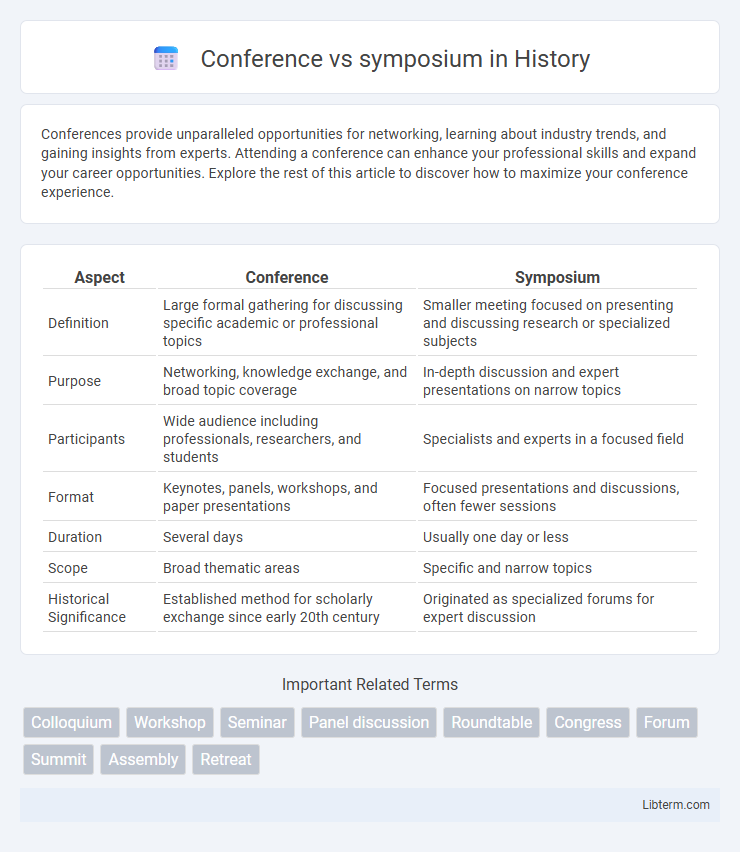Conferences provide unparalleled opportunities for networking, learning about industry trends, and gaining insights from experts. Attending a conference can enhance your professional skills and expand your career opportunities. Explore the rest of this article to discover how to maximize your conference experience.
Table of Comparison
| Aspect | Conference | Symposium |
|---|---|---|
| Definition | Large formal gathering for discussing specific academic or professional topics | Smaller meeting focused on presenting and discussing research or specialized subjects |
| Purpose | Networking, knowledge exchange, and broad topic coverage | In-depth discussion and expert presentations on narrow topics |
| Participants | Wide audience including professionals, researchers, and students | Specialists and experts in a focused field |
| Format | Keynotes, panels, workshops, and paper presentations | Focused presentations and discussions, often fewer sessions |
| Duration | Several days | Usually one day or less |
| Scope | Broad thematic areas | Specific and narrow topics |
| Historical Significance | Established method for scholarly exchange since early 20th century | Originated as specialized forums for expert discussion |
Understanding Conferences and Symposiums: Key Definitions
Conferences are large-scale events designed for professionals to exchange ideas, present research, and network across various industries, often spanning multiple days with multiple sessions. Symposiums are more focused gatherings, typically centered around a specific academic or scientific topic, featuring expert presentations and in-depth discussions. Both formats facilitate knowledge sharing but differ in scope, scale, and audience engagement.
Primary Objectives: Conference vs Symposium
A conference aims to facilitate broad knowledge exchange and networking among experts across multiple disciplines, promoting collaboration and the dissemination of recent research findings. In contrast, a symposium focuses on in-depth discussion and presentation of specific topics or issues within a specialized field, often involving experts sharing detailed insights and advancing subject-specific understanding. Both platforms emphasize scholarly interaction, but conferences have a wider scope, while symposiums target concentrated academic discourse.
Structure and Format Differences
A conference typically spans multiple days with various sessions, including keynote speeches, panel discussions, workshops, and networking events, accommodating a large audience across diverse topics. A symposium is usually shorter, often a one-day event, focused on a single subject or theme with structured presentations and in-depth discussions by experts. Conferences emphasize breadth and interdisciplinary exchange, while symposia prioritize depth and specialized academic dialogue within a specific field.
Types of Participants and Their Roles
Conferences typically attract a diverse group of participants including researchers, industry experts, and students who engage in keynote speeches, paper presentations, and networking sessions to exchange knowledge and foster collaborations. Symposiums usually involve a smaller, more specialized audience, often composed of experts and scholars focusing on in-depth discussions and critical analysis of specific topics within a field. Participants in symposiums often serve as panelists or commentators, contributing detailed insights and facilitating expert debates.
Scale and Scope of Events
Conferences typically host a larger scale of participants, often including multiple sessions, keynote speakers, and various topics within a broader field. Symposiums are usually smaller, more focused events concentrating on a specific subject or niche area, facilitating in-depth discussions and expert interactions. The scope of conferences is broader, aiming to cover a wide range of issues, while symposiums target specialized knowledge exchange in a particular domain.
Topics and Themes Presentation
Conferences typically cover a broad range of topics and themes within a particular field, facilitating diverse presentations from multiple experts and professionals. Symposiums concentrate on a specific subject or theme, allowing for in-depth discussions and focused presentations among specialists. This targeted approach enables symposium attendees to gain detailed insights and foster specialized knowledge exchange.
Duration and Scheduling
Conferences typically span multiple days, often lasting three to five days, with a diverse schedule that includes keynote speeches, panel discussions, and workshops. Symposia are generally shorter, usually one to two days, focusing on a specific topic or theme with a concentrated agenda of presentations and discussions. Scheduling in conferences allows for varied time slots accommodating networking and informal interactions, whereas symposia follow a more compact, tightly organized timetable aimed at intensive academic or professional exchange.
Interaction and Networking Opportunities
Conferences typically offer extensive interaction and networking opportunities through diverse sessions, workshops, and social events that bring together large groups of professionals across various fields. Symposiums feature more focused, smaller-scale gatherings that encourage in-depth discussions and direct engagement among experts with a shared specialization. The scale and format of conferences foster broader networking, while symposiums provide intensive interaction tailored to specific academic or professional communities.
Outcomes and Deliverables
Conferences typically generate broad outcomes such as networking opportunities, widespread knowledge dissemination, and industry trend identification, while symposiums focus on more specialized deliverables including detailed research presentations, in-depth discussions, and consensus-building on specific topics. Conference outcomes often include published proceedings and increased visibility for participants, whereas symposium deliverables emphasize actionable insights and collaborative problem-solving within expert communities. Both formats aim to advance understanding but differ in scope, depth, and the immediacy of their impact on participants and fields.
Choosing the Right Event: Conference or Symposium?
Choosing the right event hinges on your professional goals and the depth of discussions desired: conferences feature broader topics and larger audiences ideal for networking and exposure, while symposiums focus on specialized subjects with intensive expert dialogue. Conferences often span several days with multiple sessions, workshops, and keynote speakers, catering to diverse interests within a field. Symposiums emphasize scholarly exchange and collaborative problem-solving, suited for advancing specific research or technical knowledge.
Conference Infographic

 libterm.com
libterm.com